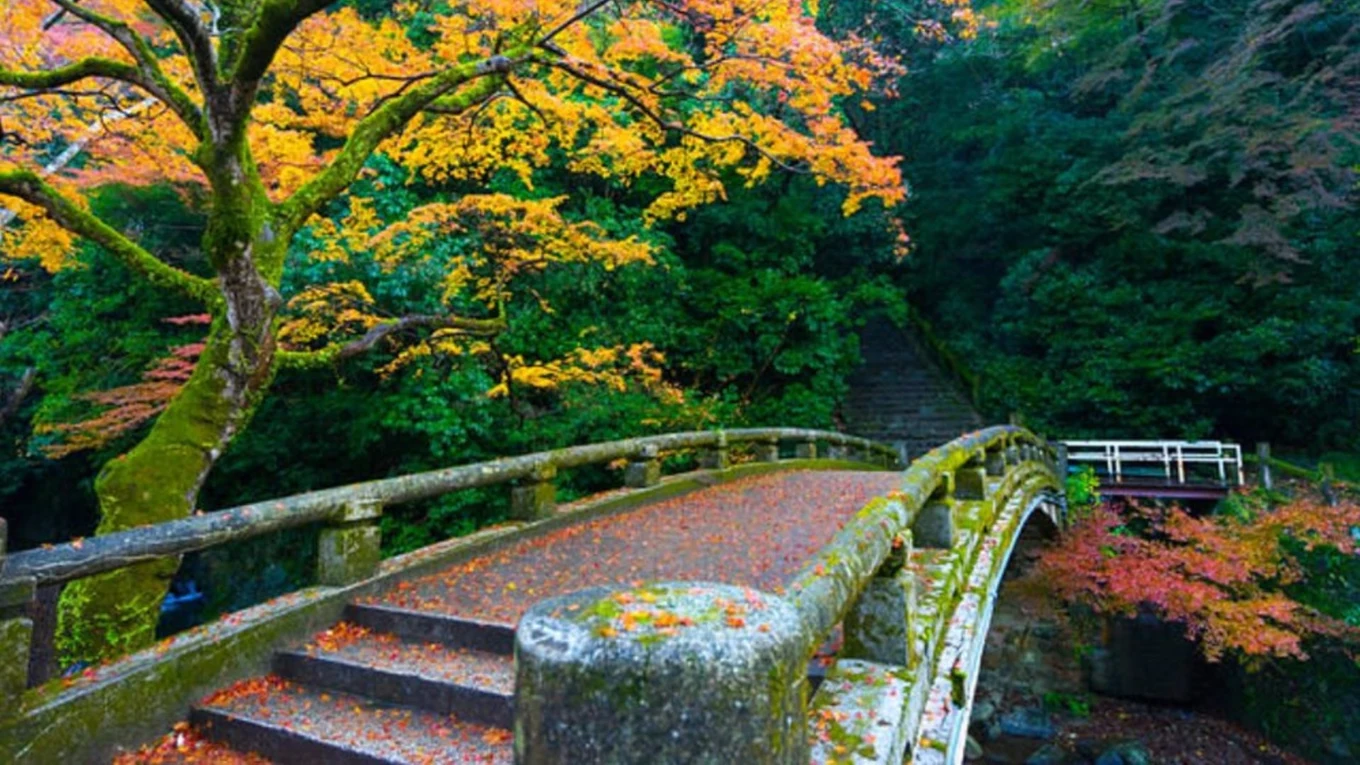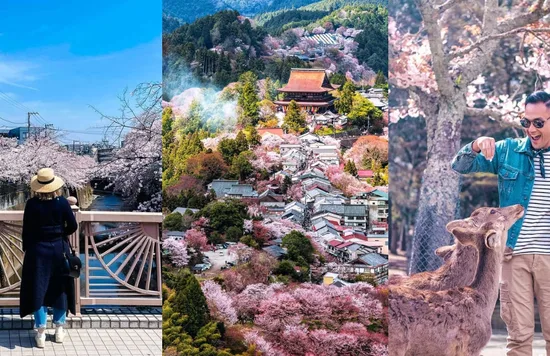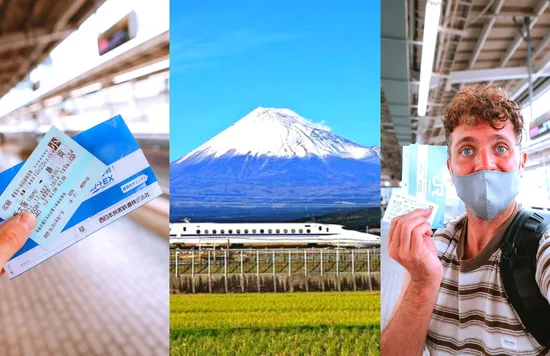Although Cherry Blossom season is the most well-known season of Japan , you’d be crazy to ignore Autumn in Japan—aka the Momijigari (Red Leaf Hunting). For three months a year, the Land of the Rising Sun is ablaze with a sea of gold and red. Autumn in Japan is stunning, temperatures dip after the scorching summer, and the colours of the leaves change to vibrant shades of orange, red, yellow, and brown. It’ll make your IG feed a total vibe!
If you still want to see cherry blossoms off-season, check out our guide:
Now, back to stunning autumn in Japan. If you’re planning to see the fantastic fall foliage, here’s everything you need to know about what’s arguably the country’s best season:
What months are autumn in Japan?
Japan is a rather long and slim archipelago, so it experiences different climates in different areas. While autumn in Japan generally starts from mid-September all the way to early December, it typically starts in Hokkaido, while the rest of the regions may experience it from October to November. So if you want to visit a specific region, make sure to time your trip during peak momijigari season.
What is Japan like in autumn?
Autumn in Japan is highly anticipated both by locals and tourists alike, especially the changing of colours known as koyo. Locals look forward to annual forecasts that predict when the fall colours will finally emerge, and the surroundings will transform into yellow, gold, and red.
Did you know Japan actually has two waves of foliage changes in the season—one for yellow leaves and another for red ones?
The ginkgo trees of greater Tokyo will turn yellow, and the maple trees will follow by turning red.
When is the best time to see autumn colours in Japan?
Hokkaido experiences the start of Japan’s autumn foliage season first. It starts in mid-September and ends in early November. The best viewing times are from October to December in other parts of Japan, like Tokyo and Kyoto.
Why is autumn the best season in Japan?
Besides the gorgeous autumnal colours, the season makes way for cool and pleasant weather. It’s the perfect time to wear your cute knit sweaters and go for walks in the cities and towns of Japan. During this time, you won’t have to worry about the heat that summer brings or the rains of Spring. Sure, autumn in Japan can get a tad chilly, especially right before winter starts, but that’s what fall coats and sweaters are for! Because of the scenery, weather, and fabulous fall fashion, many agree that autumn is the best season in Japan.
Where are the best places to enjoy autumn in Japan?
Osaka
1. Minoo Park
Minoo Park is one of the best spots to enjoy autumn in Japan. It’s a beautiful park, about 30mins outside of the commercial centre, and as such, is free from the usual crowds—meaning no need to crop tourists out of your photos!
For the best shot, follow the inclined path and look back across the bridge—you won’t be disappointed. And don’t forget to try the freshly fried maple leaf tempura from any of the street shops in Minoo Park!
Minoo Park
Address: 1-18 Minookoen, Minoo, Osaka 562-0002, Japan
Operating Hours: 24 hours
Nearest Station: Senri-Chuo Subway Station (via the Amazing Osaka Pass)
#KloolTip: Minoo Park is located in Osaka, where you can easily get around using the subway, tramway, and bus using the Osaka Amazing Pass!
2. Osaka Castle
Plunge deep into a golden oasis of ginkgo trees when you drop by the iconic Osaka Castle. This heritage site has long been a popular picnic spot and especially so during the fall season. Many passionate autumn fans lean against ginkgo trees to catch sight of the grand castle draped in yellow hues.
To capture THE shot, climb to the top of Osaka Castle for a majestic overview of Japan’s finest city. Not a single photobomber in sight!’
After exploring Osaka, you can explore other areas of Japan with the JR Whole Japan Rail Pass! Not only will you get access to various railways, but you’ll also be able to ride local buses and Miyajima Ferry.
Osaka Castle
Address: 1-1 Osakajo, Chuo Ward, Osaka, 540-0002, Japan
Operating Hours: 9am to 5pm
Entrance fee: 600 Yen ($7.57)
Nearest Station: Osakajokoen Station (via the JR pass)
Kyoto
3. Sagano Romantic Train
Hop aboard the Sagano Romantic Train, a 25-minute ride that takes you around the Arashiyama district. As you glide past landscapes flamed in a blanket of fiery red, you’ll understand why it’s known as one of the most romantic trails…*sigh*
Sagano Romantic Train
Opening Hours: 9am to 4pm
Nearest Station: Arashiyama Station (via the JR Pass)
4. Tofukuji Temple
For the “avid fans of autumn” (and yes, that's a thing), the autumn foliage at Tofukuji Temple is a household name. Every year, the Zen temple at Southeastern Kyoto blossoms into the most vibrant crimson, beckoning locals and travellers alike to fall in love with Japan all over again.
The best vantage point is not at the peak of Tofukuji Temple but along the Tsutenkyo Bridge. The 100-meter-long walk is lavished with valleys of burgundy maple trees, another sight you wouldn’t want to miss. Capture the temple at its peak in November.
Tofukuji Temple
Address: 778 Honmachi, Higashiyama Ward, Kyoto, 605-0981, Japan
Opening Hours: 9am to 5om (April to October); 8.30am to 4pm (November to early December); 9am to 3.30pm (December to March)
Nearest Station: Tofukuji Station (via the JR Pass)
5. Tenryuji Temple
Second to none, the Tenryuji Temple is another unbeatable spot for catching autumn hues. Waste no time and head straight inside to the Hyakkaen Garden for even more stunning foliage.
This UNESCO World Heritage Site is also home to famous paintings like “The Cloud Dragon” right on the ceiling of the Hatto Hall, which are well worth a stop, especially if you’re with your significant other!
If both the Tofukuji and Tenryuji Temples are on the agenda for autumn in Japan and you prefer being chauffeured around (who doesn’t!?), then this Maple Leaf Tour is for you.
Tenryuji Temple
Address: 68 Susukinobaba-cho, Saga Tenryu-ji, Ukyo-ku
Opening Hours: 8.30am to 5.30pm (21st March to 20th October); 8.30am to 5pm (21st October to 20th March)
Nearest Station: Arashiyama Station or Saga Station (via the JR Pass)
Tokyo
6. Watarase Keikoku Railway
A ride on the Watarase Keikoku Railway is like a scene straight out of a romcom!
Even the lazy are rewarded here! Simply sit back and soak in the gorgeous swath of red gliding by.
Once outside the city, the Takatsudokyo Gorge is a stop along the Watarase Keikoku Railway route worth sitting up for. The popping red bridge is hard to miss and makes for a great photo! If you’re feeling energetic, you can disembark here and cross the iconic geometric bridge for another vantage point of the amber rainforest.
Takatsudokyo Gorge
Address: Omama, Midori City, Gunma
Opening Hours: 24 hours
Nearest Station: Omama Station (via the JR Pass)
Speaking of railways, you can enjoy unlimited rail travel with the JR Whole Japan Rail Pass! This also includes access to local buses and Miyajima Ferry, so exploring Japan will be as easy as pumpkin pie.
7. Rikugien
Rikugien is Tokyo’s most famous landscaped garden, with aesthetics you’ll find during the Edo period. The garden actually takes a whole hour to cover, so be sure to set aside sufficient time. Accentuated by the peaceful stream running along the Togetsukyo Bridge, the entire setup is one #insta-worthy backdrop that will up your photo game.
Most places close when the day ends but not for Rikugien. Travellers and locals alike can still catch the autumn season in full bloom even when the sun has long set—it’s well worth a visit after dark.
Rikugien
Address: 6 Chome-16-3 Honkomagome, Bunkyo City, Tokyo 113-0021, Japan
Opening Hours: 9am to 9pm (Closed 21st December to 1st January)
Entrance Fee: 300 yen
Nearest Station: Komagome Station (via the JR Pass & Tokyo Subway Ticket)
8. Icho Namiki
The best sightseeing trails are best paired with a full-blown festival of tasty street food! Every year, as a part of the Jingugaien Itcho Festival (mid-November to early December), food vendors line the sidewalks and offer Japanese dishes, from bite-sized food like takoyaki (Octopus balls) to hearty bowls of ramen and donburi. What better way to enjoy the most spectacular ginkgo blossoms than with a camera in one hand and tasty snacks in the other?
Icho Namiki
Address: 1 Kasumigaoka, Shinjuku-ku Tokyo
Opening Hours: 10am to 5.30pm
Nearest Station: Gaienmae Station or Aoyama-Itchome Station (via the Tokyo Subway Ticket)
You easily get around Tokyo and visit these stops by going on the Tokyo Subway!
Hokkaido
9. Blue Pond
The Blue Pond is exactly what it's named after, a pond so cobalt-blue that in the absence of wind, a moment of stillness would turn the crystal surface into a mirror reflection. Despite its underrated reputation, this hidden gem in Hokkaido absolutely deserves a visit in Fall. The surrounding mountain erupts into an eye-catching palette of yellow and green, creating a visually stunning contrast against the Blue Pond.
Want to explore the Blue Pond and other Hokkaido must-visit spots? Then go on the Autumn Day Trip from Sapporo!
Blue Pond
Address: Shirogane, Biei-cho, Kamikawa-gun, Hokkaido
Opening Hours: 24 hours
Nearest Station: Biei Station (via the JR Pass)
10. Daisetsuzan National Park, Kogen Onsen Ponds
Any seasoned hikers in Japan would know that Daisetsuzan National Park has nothing shy of the most spectacular autumn scenes. However, only regulars would know that the real deal is near the river beds. Kogen Onsen Ponds is a hot spring located deep inside the park. Definitely an autumn pick for those on board the #fitspo journey, the trade-off is guaranteed worth the sweat.
If you prefer taking things easy, we have just the plan for you: go on this two-day-one-night day trip with autumn leaves viewing:
Daisetsuzan National Park
Address: Yukomanbetsu, Higashikawa, Kamikawa District, Hokkaido Prefecture 071-1472
Opening Hours: 24 hours
Nearest Station: Kamikawa Station (via the JR Pass)
How do I get to places in Japan with autumn leaves? (JR pass)
To get to all of Japan’s prime autumn spots in the 4 cities, we recommend getting the Whole Japan Rail Pass which is available for 7 days, 14 days or 21 days. This Pass grants unlimited rides on the JR lines, local buses and even a Miyajima ferry across the WHOLE of Japan with utmost ease and comfort.
Still have doubts? We’ve compiled a detailed JR Pass guide to figuring things out.




































